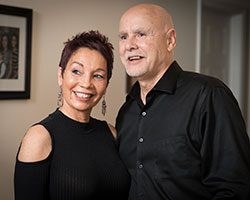James McNutt
Independence man survives dramatic heart attack
St. Elizabeth team delivers dozens of shocks with defibrillator
It was a blazing, hot summer day, and James McNutt, a longtime history professor at Thomas More College, will never forget it.
As he mowed his lawn in Independence, Kentucky, James, age 61, felt chest pain. At first, he thought it was indigestion from hot dogs he ate for lunch, but the pain grew unbearable. He started to sweat, and a dip in the pool and a cold shower didn’t cool him down.
“My arms started to go weak. I was losing feeling in my hands,” remembers James. “Something was very wrong.”
No one was home, so James called his wife, Angie, at work.
“He was very breathy,” says Angie McNutt. “Something in his voice told me I needed to call 911 right away.”
As it turns out, Angie’s decision to take quick action and call 911 instead of driving home was critical. James was having a heart attack. Over the next 70 minutes, his heart stopped dozens of times.
The EMS crew from Independence and the emergency team at St. Elizabeth shocked him with a defibrillator 40 times — yes, 40 times — fighting to keep him alive.
“Fortunately, when James first went into cardiac arrest, he was in the ambulance, where they could shock him with a defibrillator,” says Dr. Kevin Fitzgerald, Interventional Cardiologist, with the St. Elizabeth Heart & Vascular Institute. “Then, in the Emergency Department, we did CPR to maintain blood pressure to his vital organs, and we shocked him again, dozens of times. Mr. McNutt had about as many episodes of cardiac arrest as I have seen in a surviving patient.”
Emergency team takes action
Angie arrived at St. Elizabeth in time to witness the scene in the emergency room.
“Over and over, the doctors kept saying, ‘He’s going into v-fib. Clear. Shock. No pulse. He’s going into v-fib. Clear. Shock.’” says Angie. “And I begged them not to stop.”
In fact, the medical team had to shock James’ heart every few feet as they rushed him to the cath lab in hopes of clearing the blockage that triggered the cardiac arrest.
“Eventually, we were able to open a blockage in his right coronary artery with a balloon and put in two stents to restore blood flow,” explained Dr. Fitzgerald. “That quieted everything down.”
Angie will never forget the moment Dr. Fitzgerald came into the waiting room and said that her husband would be okay.
“Nurses started crying. I was crying. I was hugging Dr. Fitzgerald. It was intense,” remembers Angie.
James and Angie are beyond grateful.
“St. Elizabeth and the EMS went above and beyond. They didn’t know me; I was just another person being brought in,” says James. “They gave me care as if I was the president of the United States. They didn’t stop.”
“They did everything they could to save my husband.” says Angie. “They were under the guidance of God. Without that team, James would not have made it.”
Wife’s 911 call meant difference between life and death
After his heart attack, James participated in St. Elizabeth’s cardiac rehabilitation program. Within a couple months, he started a gradual return to his job as professor and chairman of the history department at Thomas More College. He’s doing well and feels lucky to be alive.
Dr. Fitzgerald credits Angie for calling 911 — always the best option.
“Don’t have someone drive you to the hospital,” advises Dr. Fitzgerald. “Many people suffer cardiac arrest in the car and don’t make it in time. The key message when you have chest pain is to call 911.”
Behind the scenes, as James McNutt’s emergency unfolded, St. Elizabeth activated new, state-of-the-art technology that allows emergency teams to care for heart patients quickly and efficiently. The rescue crew in the ambulance sent a picture of James’ EKG to the Emergency Department through LifeNet computer system. A new app called Pulsara notified the Cardiologist and Cath Lab simultaneously, allowing them to see the EKG and be ready and waiting for James when he arrived.
Heart attacks can happen to anyone. Be prepared. Read here to learn more about heart attack symptoms.


